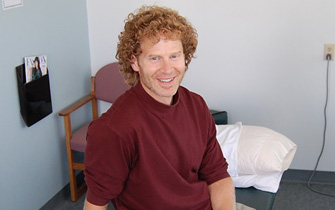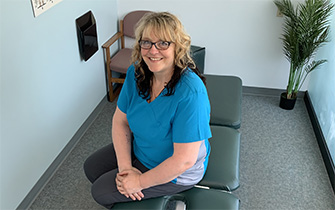The constant neck or back pain, headaches, and stiffness can make even simple daily tasks feel overwhelming. Our team of physiotherapists and massage therapists are here to support you with personalized treatment plans designed specifically for your recovery journey. Whether your whiplash stemmed from a car accident, a sports injury, or an unexpected fall, we’re committed to alleviating your pain, restoring your mobility, and helping you get back to the activities you love.

What is Whiplash?
Whiplash is a neck injury that occurs when the head is suddenly jerked forward and backward, much like a whip cracking. This rapid movement can cause damage to the muscles, ligaments, and tendons in the neck. Whiplash is commonly associated with car accidents, but it can also result from sports injuries, falls, or other trauma.
There are also a number of other tissues that get overstretched, compressed and damaged, including nerves, blood vessels, joint capsules, and vertebral discs. The joints themselves also get compressed during whiplash, leading to cartilage damage, bone bruising, and possible compression fractures if severe enough.
What are the different types of whiplash?
Whiplash is diagnosed into four types of Whiplash Associated Disorders (WAD): WAD 1, WAD 2, WAD 3, and WAD 4.
- WAD 1 is characterized by a complaint of neck pain, stiffness or tenderness without any physical signs. The range of motion is fine, there is no significant muscle tenderness on palpation, and joint movement is normal.
- WAD 2 is characterized by a complaint of neck pain and a musculoskeletal sign(s), such as decreased range of motion and tenderness.
- WAD 3 is characterized by a complaint of neck pain and some kind of neurological sign, such as reduced/altered sensation, and muscle weakness due to nerve injury.
- WAD 4 is the most serious and is characterized by a complaint of neck pain as well as a fracture or dislocation.
Have you been recently diagnosed with a WAD injury? Book an appointment today to feel better, fast!
What are the common signs or symptoms of whiplash?
Common signs and symptoms of whiplash include:
- Muscles in the neck and back feel stiff and tight
- Reduced range of motion/flexibility in the neck or back
- Headaches
- Dizziness, tinnitus
- Jaw pain
- Numbness and/or tingling in arms, hands, fingers
Experiencing whiplash symptoms? Let us help you recover – book an appointment now!
How is whiplash diagnosed?
Diagnosing whiplash involves a comprehensive evaluation by a healthcare professional. At Summit Physiotherapy & Massage, our diagnosis process includes:
- Medical History Review: We start by reviewing your medical history, including details of the injury event, any previous neck injuries, and your overall health status.
- Physical Examination: During the physical examination, our physiotherapists will assess your neck’s range of motion, check for areas of tenderness or pain, evaluate strength and reflexes, and look for any signs of neurological impairment.
- Diagnostic Imaging (if necessary): In some cases, we may refer you to your physician for additional diagnostic tests such as X-rays, CT scans, or MRIs that may be necessary to rule out other conditions or assess the extent of your injury.
When should you seek treatment after suspected whiplash?
Whiplash can occur in various situations, such as car accidents, sports injuries, falls, or any sudden impact that jerks the head. If you suspect you have whiplash, it’s crucial to seek treatment as soon as possible. Early intervention can prevent the condition from worsening and reduce the risk of chronic pain. You should seek treatment immediately if you experience severe neck pain, stiffness, headaches, dizziness, or any symptoms of nerve damage, such as numbness or tingling in the arms.
Even if symptoms seem mild at first, getting a professional assessment ensures proper care and accelerates your recovery. Act now — prompt treatment is key to effective healing and preventing long-term complications.
How long does whiplash typically last?
The duration of whiplash symptoms can vary depending on the severity of the injury and the promptness of treatment. Mild cases may resolve within a few days to a few weeks, while more severe cases can take several months to heal.
On average, most individuals recover from whiplash within 3 to 6 months with proper physiotherapy and massage therapy. However, approximately 15% of people may experience persistent symptoms beyond this period. Early and consistent therapy can improve your chances of a quicker recovery and reduce the likelihood of prolonged symptoms.
What happens if whiplash goes untreated?
Leaving whiplash untreated can lead to a range of complications and long-term issues, including:
- Chronic Pain: Persistent neck and back pain can develop, significantly impacting your quality of life.
- Reduced Mobility: Untreated whiplash can lead to long-term stiffness and reduced range of motion in the neck and shoulders.
- Headaches and Migraines: Chronic headaches and migraines may become more frequent and severe without proper treatment.
- Nerve Damage: Ongoing tingling or numbness in the arms and hands can result from untreated nerve damage.
- Emotional Distress: Chronic pain and reduced mobility can lead to anxiety, depression, and other emotional issues.
Early intervention with physiotherapy and massage therapy are essential to prevent these complications and ensure a full recovery.
Our Approach to Whiplash Treatment
We take a comprehensive and personalized approach to treating whiplash. Our goal is to alleviate your pain, restore your mobility, get you back to your active lifestyle as soon as possible and prevent future injuries. Here’s how we can help:
Initial assessment
Your journey to recovery begins with a thorough assessment by one of our experienced physiotherapists. During this initial visit, we will:
- Review your medical history
- Conduct a physical examination
- Evaluate the extent of your injury
- Discuss your symptoms and any limitations you’re experiencing
- Give you exercises and stretches to start your rehabilitation program
Customized treatment plan
Based on your assessment, we will create a customized treatment plan tailored to your specific needs. This may include:
- Manual Therapy/Myofascial Release: Hands-on techniques that work on the muscles, connective tissue and joints to reduce pain and soft tissue tension, restore joint function and improve mobility.
- Exercise Therapy: Specific exercises to strengthen the muscles that support the neck and back, and stretches to reduce muscle tension, improve range of motion, and promote healing.
- Intramuscular stimulation (IMS) therapy: Involves inserting thin needles (like those used in acupuncture) into muscles that are causing pain. This calms the nerves and relaxes tight muscles.
- Acupuncture: Using acupuncture needles to restore energy balance within the body to reduce pain, inflammation and soft tissue tension.
- Postural Training: Guidance on maintaining good posture to alleviate strain on your neck.
- Pain Management: Techniques such as heat/cold therapy, ultrasound, or electrical stimulation to manage pain.
- Education: Information on self-care strategies and ergonomic advice to help our clients return to work and the activities they enjoy and to prevent future injuries.
Ongoing support and monitoring
Recovery from whiplash can take time, and we are committed to supporting you throughout your journey. We will:
- Monitor your progress and adjust your treatment plan as needed
- Provide continuous education and support to help you achieve your recovery goals
- Offer advice on activities and exercises to prevent re-injury
Ready to start your whiplash recovery journey? Reach out and schedule an appointment today!
Find Healing with Our Skilled Whiplash Treatment Professionals
Not sure which member of our team to work with? We can help! Contact our clinic today.
Frequently Asked Questions
How long does it take for severe whiplash to heal?
Whiplash can take weeks to months to heal (with treatment). It usually resolves between 3 and 6 months, but about 15% of people will continue to have some symptoms. Working with an experienced physiotherapist and massage therapists can help improve your outcomes and healing time.
Can a physiotherapist diagnose whiplash?
Yes, physiotherapists are qualified to diagnose and treat whiplash.
How can I sleep with whiplash?
Sleeping with whiplash can be difficult! Here are some tips on how to get to sleep when you have painful whiplash:
- Try to keep your head in a neutral position with a pillow that stabilizes your head. A neutral position is where your head is not flexed or extended, not rotated or tilted to either side.
- Place a pillow under your knees while sleeping on your back or place a pillow between your knees/ankles if you sleep on your side.
- You may benefit from using a heating pad or doing your stretches before going to bed
- A contoured neck pillow may be helpful
- Take medication if advised by your physician
Are there any activities I shouldn’t do if I have whiplash or a concussion?
There are activities that you should avoid if you have whiplash or a concussion, but it depends on the stage of your healing. You can do almost anything as long as you do not have symptoms or in other words, if it hurts, don’t do it. In general, avoid any prolonged and sustained positions such as sitting at your work desk or standing for a long time. You also may want to avoid any impact or highly strenuous activities initially as this may increase your muscle tension. Activities that involve heavy lifting or repetitive lifting over shoulder height is not recommended as this may exacerbate your symptoms. With all of this being said, it is extremely important to stay moving and active and keep exercising as your symptoms allow.
In the early stages of concussion, you should avoid bright lights and loud noises as well as lots of visual movement since this will reproduce symptoms.
Any activity that increases your heart rate, involves impact, and involves quick head movements can reproduce symptoms and should also be avoided at all stages of a concussion.
Ready to book an appointment?
Our physiotherapists and massage therapists have extensive experience treating whiplash injuries. Starting treatment today is the best way to promote faster healing, reduce the pain from your symptoms, and get you on the right track towards recovery.







